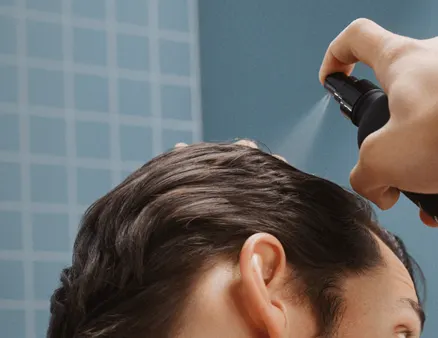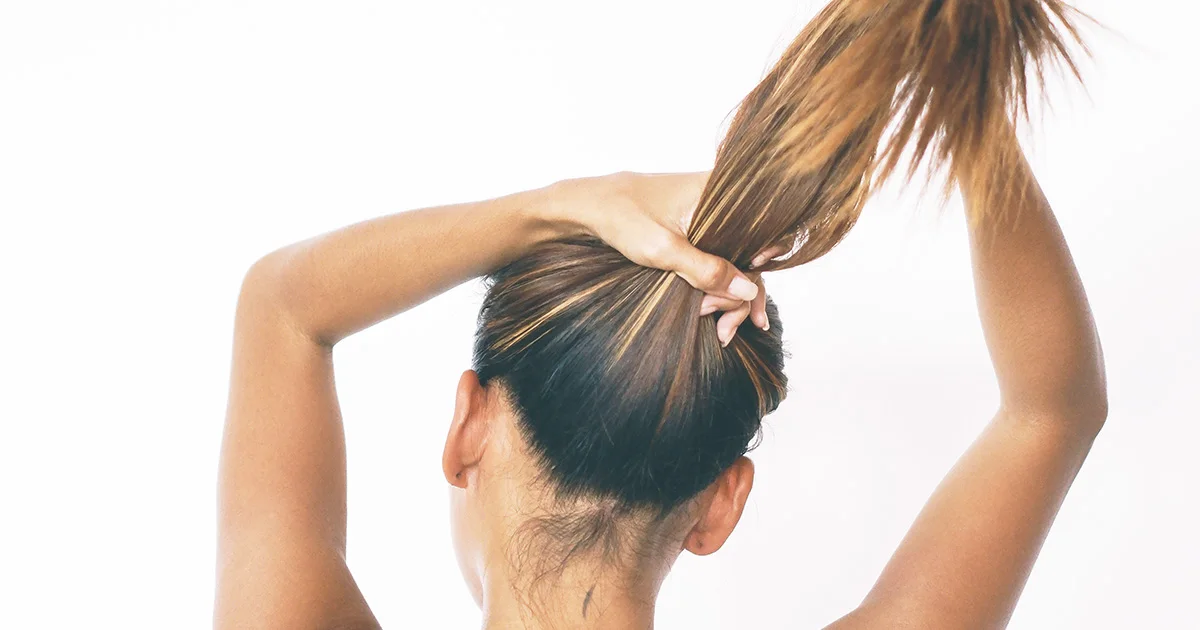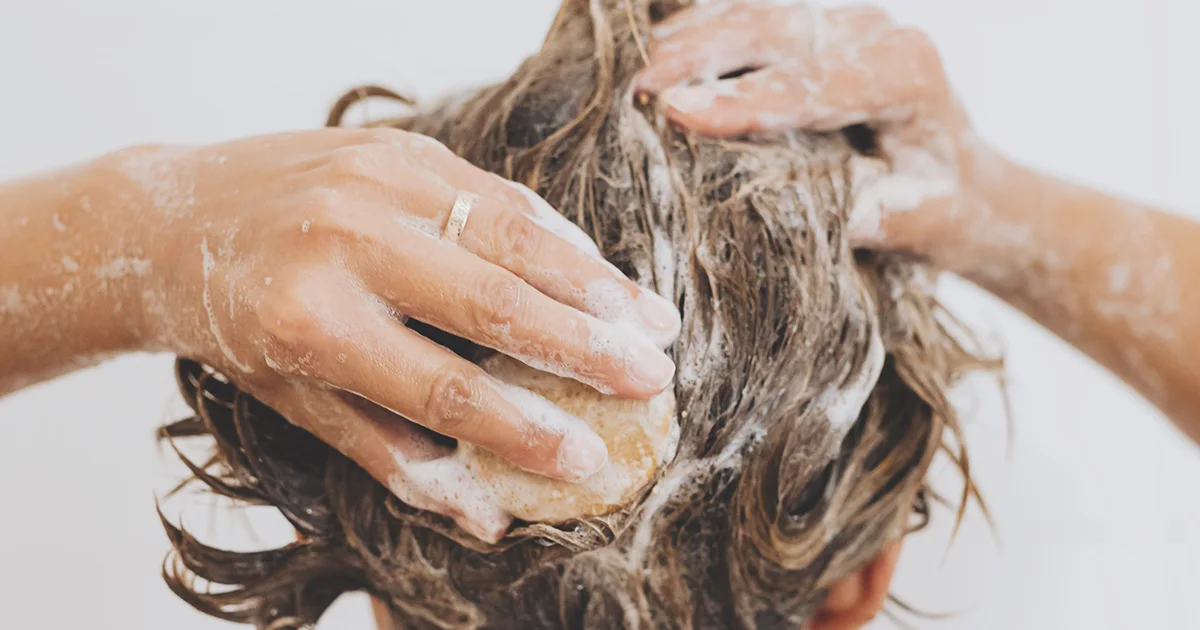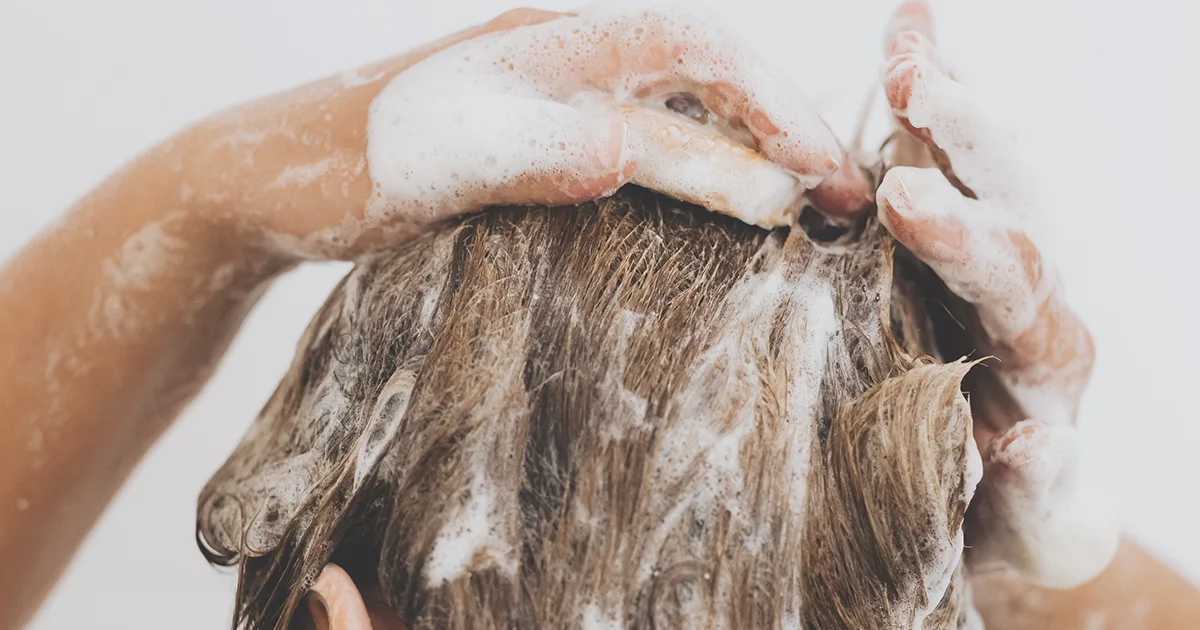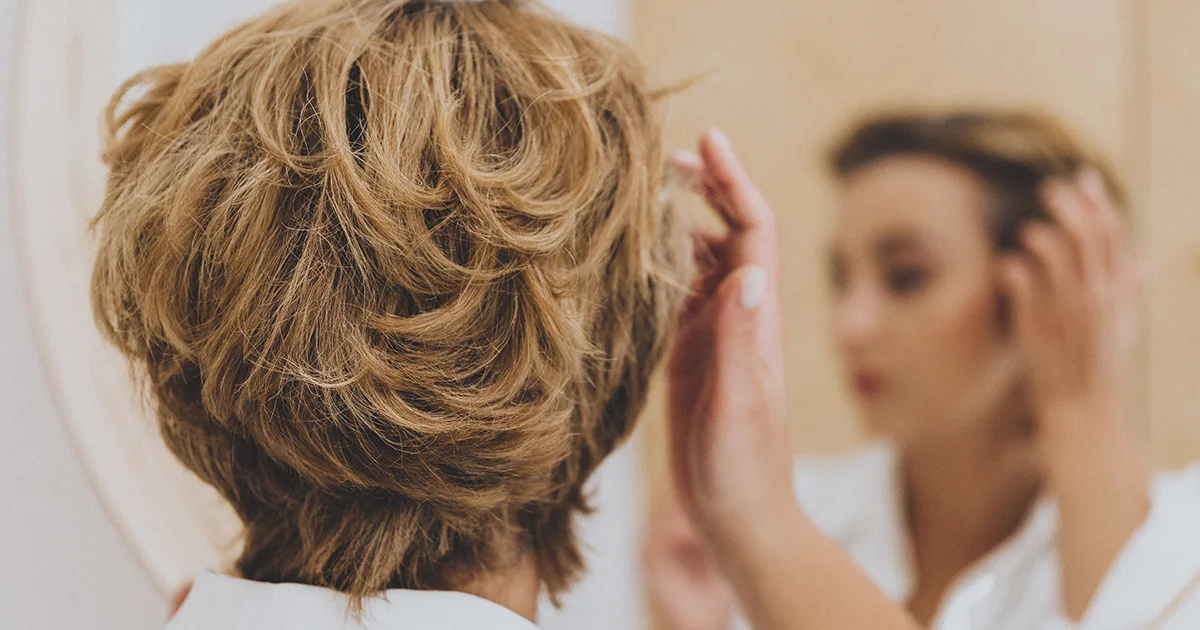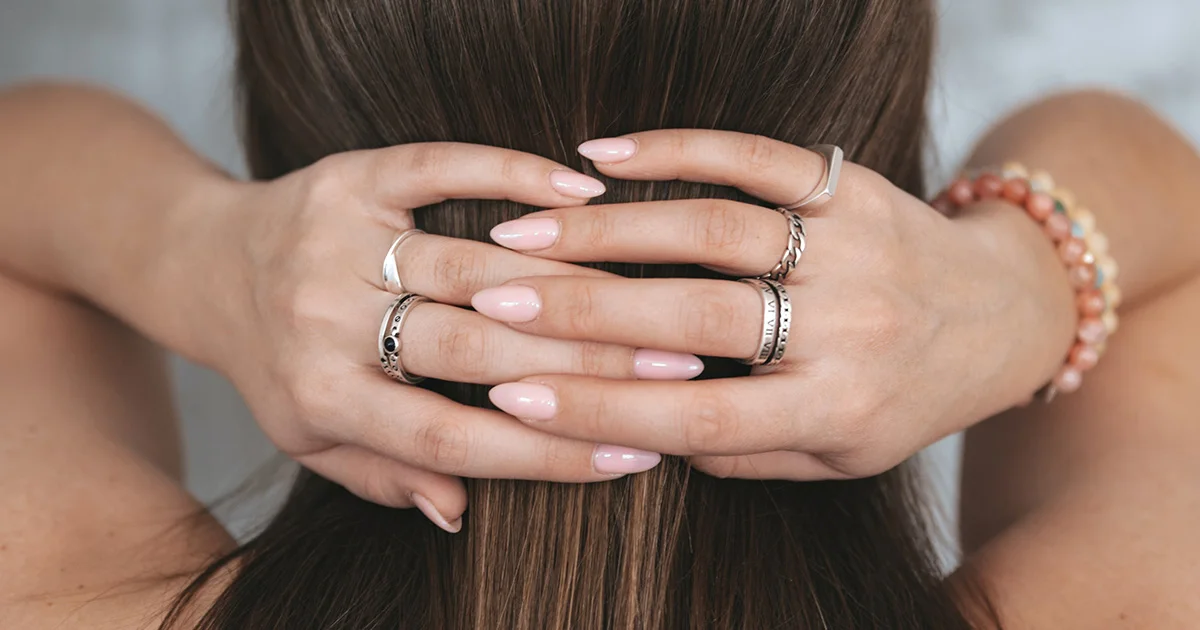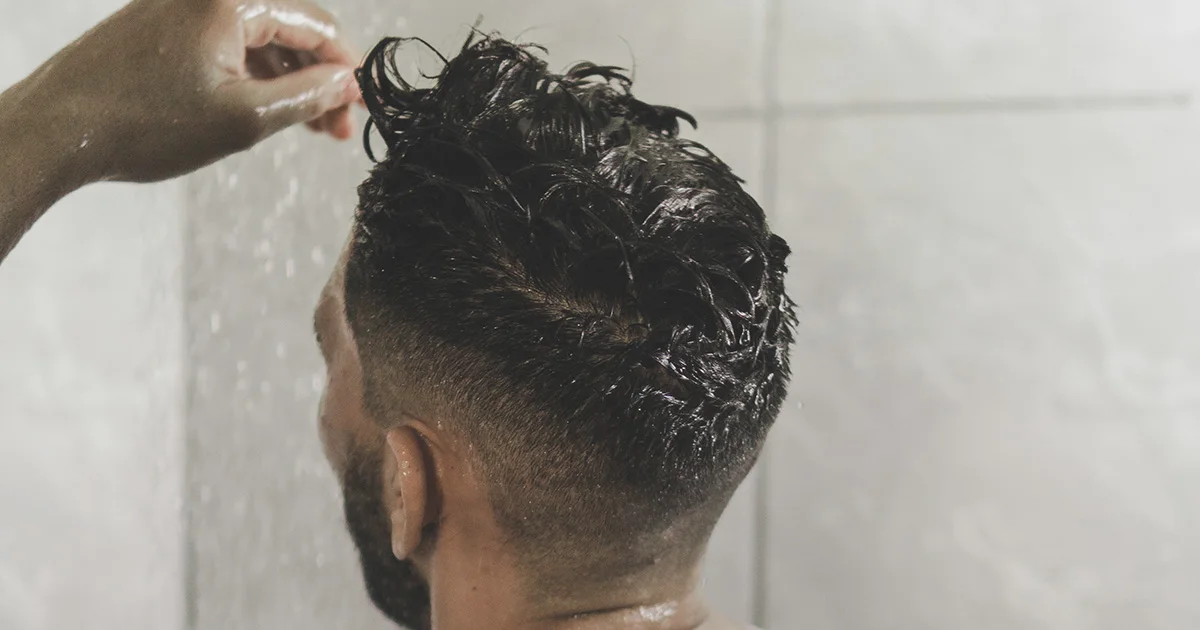Here's what we'll cover
Here's what we'll cover
If you’re desperate to treat your dandruff, you may find yourself turning to the internet for answers. While there are a variety of DIY home remedies and treatments that people claim have helped them target dandruff, it’s tough to know which ones are worth a try. Apple cider vinegar is one particularly popular home remedy option for dandruff—so is it a legit option, or should you opt for something else?
What is dandruff?
Dandruff is a common skin problem that affects the scalp. Dandruff is linked to—and sometimes caused by—an inflammatory skin condition called seborrheic dermatitis, which causes white flakes or yellow scales to form on areas of the body that have a lot of oil (NIH, 2019). Dandruff can cause dry scalp and also cause redness, skin irritation, and/or itchy scalp. Dandruff usually develops after puberty in people who get it, and it’s more common in men than in women (NIH, n.d.). About 50% of the general adult population, globally, experiences dandruff (Borda, 2015).
What causes dandruff?
There are a lot of different factors that can contribute to the development of dandruff. While it’s considered to be the same basic condition as seborrheic dermatitis, dandruff only affects the scalp (seborrheic dermatitis can affect the scalp, face, the area behind the ears, and the upper chest). But both dandruff and seborrheic dermatitis can cause yellow or white flaking and scaling that’s either oily or dry (Borda, 2015).
Some people get dandruff because they have very dry skin. Sometimes this extremely dry skin is caused by a dermatological condition called eczema (atopic dermatitis) that’s characterized by itchy, dry, and cracked skin, which can sometimes occur on the scalp and result in dandruff (NIH, 2019). Psoriasis is another skin condition that can cause dandruff. People with psoriasis generally develop itchy or sore patches of thick, red skin to develop on different parts of their bodies. Psoriasis is caused by a problem with the immune system and can make skin cells rise to the surface too quickly. The scales that go along with psoriasis are usually silver (NIH, n.d.).
Certain hair products can also cause dandruff for some people who are allergic to those products. Allergic reactions (called contact allergic dermatitis) can result in dandruff if the products are causing symptoms on the scalp. Other factors like stress, fatigue, extreme weather, oily scalp, immunosuppressed status (such as people living with AIDS), and certain neurological disorders can also contribute to the development of dandruff (Borda, 2015).
While there’s no specific research on the link between diet and dandruff, some studies suggest that diet may play a role in the development of seborrheic dermatitis. Researchers have found that a “Western” diet heavy in meat, potatoes, and alcohol is associated with more seborrheic dermatitis in females (Sanders, 2019).
Researchers have also found that a type of yeast-like fungus called Malassezia is found in dandruff (Rudramurthy, 2014). Malassezia is found all over the bodies of humans and animals, but researchers believe that an imbalance of bacteria may result in an overgrowth of Malassezia that causes skin conditions like dandruff (Velegraki, 2015).
How to use apple cider vinegar to treat dandruff
While there are no studies to support the use of apple cider vinegar to treat dandruff specifically, some people find it helpful to deal with dandruff symptoms. There is research, however, that demonstrates apple cider vinegar’s anti-fungal and antibacterial properties, which may make it a helpful dandruff treatment (Kang, 2003).
There’s no science-backed recipe for an apple cider vinegar rinse for dandruff, but some people recommend mixing equal parts apple cider vinegar and water and applying the mixture to the scalp (you can use a spray bottle to apply directly to your scalp). If you try this vinegar rinse, leave the mixture on your scalp for a few minutes before rinsing out. You can repeat this 1–2 times a week.
Risks and considerations of using apple cider vinegar for dandruff
There’s no research that indicates apple cider vinegar is dangerous for the scalp or skin, but there are cases of apple cider vinegar causing burns in people who have used it to try to treat moles and infections (Feldstein, 2015; Bunick, 2012).
How effective is apple cider vinegar for dandruff?
No research has been done on the effectiveness of apple cider vinegar as a treatment for dandruff. However, studies have shown that compounds of apple cider vinegar can prevent certain types of fungus from growing in a test tube (Kang, 2003).
Other remedies for dandruff
Apple cider vinegar is just one type of possible treatment for dandruff. There are lots of other options available, including over-the-counter, prescription, and home remedies.
Anti-dandruff shampoos
One of the most popular ways to combat the condition is to switch from regular shampoo to a special dandruff shampoo. There are a variety of anti-dandruff shampoos available in drugstores and an array of ingredients that can effectively target dandruff. Some of the most common active ingredients in over-the-counter dandruff shampoos that have shown to be effective are zinc pyrithione (also called pyrithione zinc), coal tar, salicylic acid, sulfur, selenium sulfide, ketoconazole, ciclopirox, and clobetasol (Ranganathan, 2010).
Coconut oil
There are also a variety of home remedies, natural remedies, and other ingredients that may be helpful in targeting and treating dandruff. Some research has indicated that the antimicrobial properties of coconut oil may make it an effective treatment for eczema and fungus, and other research has indicated its potential anti-inflammatory properties, but there’s no research directly focused on coconut oil’s effects on dandruff (Verallo-Rowell, 2008; Intahphuak, 2009).
Essential oils
Some studies indicate that essential oils may be helpful forms of dandruff treatment. One study indicates that a hair tonic formulation containing 10% lemongrass oil significantly reduced dandruff (Chaisripipat, 2015). Another study found that shampooing with a solution that contains 5% tea tree oil can be an effective and well-tolerated dandruff remedy (Satchell, 2002). Other oils like neem oil and eucalyptus oil may help improve skin conditions, but it’s unclear whether they have a direct effect on dandruff (Kaur, 2004; Orchard, 2017). Other research has found that baking soda has antifungal properties and can effectively reduce irritation and itchiness in psoriasis, but there’s no direct evidence of its effect on dandruff (Letscher-Bru, 2012; Verdolini, 2005). There’s also anecdotal evidence that onion juice may help get rid of dandruff, but there’s no research to back that up.
Omega-3 fatty acids
Consuming omega-3 fatty acids may also help address dandruff symptoms since omega-3 acids have anti-inflammatory properties. Other dietary changes may also be helpful, but there’s little to no research that supports the effectiveness of specific foods for the relief of dandruff symptoms (Calder, 2010).
DISCLAIMER
If you have any medical questions or concerns, please talk to your healthcare provider. The articles on Health Guide are underpinned by peer-reviewed research and information drawn from medical societies and governmental agencies. However, they are not a substitute for professional medical advice, diagnosis, or treatment.
Borda, L. J., & Wikramanayake, T. C. (2015). Seborrheic Dermatitis and Dandruff: A Comprehensive Review. Journal of Clinical and Investigative Dermatology, 3 (2), 10.13188/2373-1044.1000019. doi: 10.13188/2373-1044.1000019. Retrieved from https://pubmed.ncbi.nlm.nih.gov/27148560/
Bunick, C. G., Lott, J. P., Warren, C. B., Galan, A., Bolognia, J., & King, B. A. (2012). Chemical burn from topical apple cider vinegar. Journal of the American Academy of Dermatology , 67 (4). doi: 10.1016/j.jaad.2011.11.934. Retrieved from https://www.unboundmedicine.com/medline/citation/22980269/Chemical_burn_from_topical_apple_cider_vinegar_
Chaisripipat, W., Lourith, N., & Kanlayavattanakul, M. (2015). Anti-dandruff Hair Tonic Containing Lemongrass (Cymbopogon flexuosus) Oil. Complementary Medicine Research, 22 (4), 226–229. doi: 10.1159/000432407. Retrieved from https://www.karger.com/Article/Abstract/432407
Feldstein, S., Afshar, M., & Krakowski, A. C. (2015). Chemical Burn from Vinegar Following an Internet-based Protocol for Self-removal of Nevi. The Journal of Clinical and Aesthetic Dermatology, 8 (6), 50. Retrieved from https://www.ncbi.nlm.nih.gov/pmc/articles/PMC4479370/
Intahphuak, S., Khonsung, P., & Panthong, A. (2009). Anti-inflammatory, analgesic, and antipyretic activities of virgin coconut oil. Pharmaceutical Biology, 48 (2), 151–157. doi: 10.3109/13880200903062614. Retrieved from https://www.tandfonline.com/doi/full/10.3109/13880200903062614
Kang, H. C., Park, Y. H., & Go, S. J. (2003). Growth inhibition of a phytopathogenic fungus, Colletotrichum species by acetic acid. Microbiological Research, 158 (4), 321–326. doi: 10.1078/0944-5013-00211. Retrieved from https://pubmed.ncbi.nlm.nih.gov/14717453/
Kaur, G., Alam, M. S., & Athar, M. (2004). Nimbidin suppresses functions of macrophages and neutrophils: relevance to its antiinflammatory mechanisms. Phytotherapy Research , 18 (5), 419–424. doi: 10.1002/ptr.1474. Retrieved from https://pubmed.ncbi.nlm.nih.gov/15174005/
Letscher-Bru, V., Obszynski, C. M., Samsoen, M., Sabou, M., Waller, J., & Candolfi, E. (2012). Antifungal Activity of Sodium Bicarbonate Against Fungal Agents Causing Superficial Infections. Mycopathologia, 175 (1-2), 153–158. doi: 10.1007/s11046-012-9583-2. Retrieved from https://pubmed.ncbi.nlm.nih.gov/22991095/
NIH. (2019). Seborrheic dermatitis. Retrieved from https://medlineplus.gov/ency/article/000963.htm
NIH. (n.d.). Dandruff, Cradle Cap, and Other Scalp Conditions. Retrieved from https://medlineplus.gov/dandruffcradlecapandotherscalpconditions.html
Orchard, A., & van Vuuren, S. (2017). Commercial Essential Oils as Potential Antimicrobials to Treat Skin Diseases. Evidence-Based Complementary and Alternative Medicine : eCAM , 2017, 4517971. doi: 10.1155/2017/4517971. Retrieved from https://pubmed.ncbi.nlm.nih.gov/28546822/
Ranganathan, S., & Mukhopadhyay, T. (2010). Dandruff: the most commercially exploited skin disease. Indian Journal of Dermatology, 55 (2), 130–134. doi: 10.4103/0019-5154.62734. Retrieved from http://www.e-ijd.org/article.asp?issn=0019-5154;year=2010;volume=55;issue=2;spage=130;epage=134;aulast=Ranganathan
Sanders, M. G., Pardo, L. M., Ginger, R. S., Jong, J. C. K. D., & Nijsten, T. (2019). Association between Diet and Seborrheic Dermatitis: A Cross-Sectional Study. Journal of Investigative Dermatology, 139 (1), 108–114. doi: 10.1016/j.jid.2018.07.027. Retrieved from https://pubmed.ncbi.nlm.nih.gov/30130619/
Velegraki, A., Cafarchia, C., Gaitanis, G., Iatta, R., & Boekhout, T. (2015). Malassezia Infections in Humans and Animals: Pathophysiology, Detection, and Treatment. PLoS Pathogens 11 (1): e1004523. doi: 10.1371/journal.ppat.1004523. Retrieved from https://journals.plos.org/plospathogens/article?id=10.1371/journal.ppat.1004523
Verallo-Rowell, V. M., Dillague, K. M., & Syah-Tjundawan, B. S. (2008). Novel Antibacterial and Emollient Effects of Coconut and Virgin Olive Oils in Adult Atopic Dermatitis. Dermatitis, 19 (6), 308–315. doi: 10.2310/6620.2008.08052. Retrieved from https://pubmed.ncbi.nlm.nih.gov/19134433/
Verdolini, R., Bugatti, L., Filosa, G., Mannello, B., Lawlor, F., & Cerio, R. R. (2005). Old fashioned sodium bicarbonate baths for the treatment of psoriasis in the era of futuristic biologics: An old ally to be rescued. Journal of Dermatological Treatment, 16 (1), 26–29. doi: 10.1080/09546630410024862. Retrieved from https://www.tandfonline.com/doi/abs/10.1080/09546630410024862
